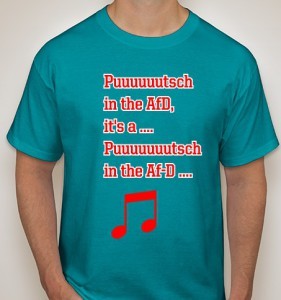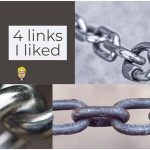Seven months before the election, what’s up with the Alternative für Deutschland?
I’ve kept repeating this since the Alternative für Deutschland’s ascendancy in the polls began in late 2015: the AfD’s electoral popularity depends on a) steering away from open right-wing extremism, which has frustrated previous attempts to establish a right-wing populist party in Germany, and b) presenting a united front. With the beginning of the (long) campaign, the party is not doing too well on both counts. Let’s have a look at seven of my favourite conflicts within the party.

#1 Right-wing extremism in Saarland – not a problem, really
The Saarland (always with the article) is a small state in the West with an interesting history and a relatively lively right-wing scene. The AfD state party is so closely involved with said right-wing extremists that the Alternative’s national executive – not normally given to anti-fascist activism – voted to disband the state party back in March 2016. However, the national executive lost a legal battle with the state party leadership, and the state party could continue. The executive then asked the state party not to field any candidates in the upcoming 2017 federal election. The state party politely declined this request. Incidentally, the state party’s number three was caught on camera selling Nazi devotionalia in his shop.
#2 Anti-Semitism in Baden-Württemberg
Shortly after the March 2016 state election in Baden-Württemberg, it emerged that Wolfgang Gedeon, one of the freshly minted MPs for the Alternative für Deutschland is an anti-Semite and conspiracy theorist. Jörg Meuthen – party leader in Baden-Württemberg, head of the parliamentary party in the Baden-Württemberg state parliament and one of the party’s two national “speakers” – , who is usually typecast as one of the remaining economic liberal/socially conservative characters in the AfD, unsuccessfully tried to expel Gedeon from the parliamentary party. As a result, the parliamentary party split in two in July. Legal and political chaos ensued. Meuthen’s co-leader Frauke Petry arrived on the scene, allegedly trying to make peace, but most observers agreed that this intervention was part of the ongoing power struggle between Petry and Meuthen. Finally, after three months of strife, the two factions re-united under Meuthen’s leadership.
#3 Candidate selection in NRW
With roughly the same population as the Netherlands, North Rhine-Westphalia (NRW) is the most populous federal state in Germany. In German Politics, NRW and its politicians are heavy-weights. The state will go to the polls in May 2017, and the result will be read as a bellwether for the federal election September. The AfD state party is lead by Marcus Pretzell, one of the two remaining MEPs for the AfD. Pretzell is controversial within “his” party. In November, he and his inner circle were accused of using undue methods to orchestrate the selection of candidates for the upcoming state election. In January, the state’s returning officer decided that although there had been irregularities, the process was deemed legal so that he would provisionally accept the list of candidates. The final decision will be made in May. While it looks unlikely at the moment, in theory the party could be barred from taking part in the election.
#4 Litigation in Schleswig-Holstein
The northern state of Schleswig-Holstein is also going to the polls in May. Thomas Tomsen, the former (until May 2016) leader of the state party has tried to sue his successor, Jörg Nobis. Tomsen claims that scores of his supporters were not invited to the assembly that elected Nobis. In January, Tomsen lost a court case on formal grounds: The judges ruled that Tomsen has to go through the internal system of party courts before he can appeal to a regular, public court. And so the former and the present leader will spend at least a part of the election campaign in court(s). The lawyer for the current leadership has defended NPD politicians in the past and is himself a well-known right-winger.
#5 Factions. More factions
In the past, the “Patriotic Platform” has brought together the right-wingers amongst the right-wingers in the AfD. But apparently, the PP has become too pussy-footed by the standards of some of their leading lights. The blick nach rechts blog reports that some former members of the PP’s federal executive are setting up the “Free Patriotic Alternative”. Judean People’s Front vs People’s Front of Judea, anyone?
#6 Höcke
Speaking of the Patriotic Platform and right-wingers, Björn Höcke, the leader of the state party in Thuringia, is the most visible amongst the ultra-right within the party. In his speeches/performances, he borrows heavily from the ideas, vocabulary, and style of the Weimar Republic’s anti-democratic right. In the past, he came under fire when he claimed that “not each and every member of the [right-wing extremist] NPD was an extremist”. Then-party leader Bernd Lucke tried to expel Höcke, but failed. Colleague Andreas Kemper has made it his life’s ambition to demonstrate that Höcke has published racist dribble in an NPD party paper pseudonymously. He is probably right. Höcke also made waves (and came close to being kicked out of the party once more) when he gave speech at an extremist think tank where he referred to Africans as a “different species” which pursues “an expansive pro-creational strategy”.
His latest exploit was a speech in which he said that the Holocaust memorial in Berlin was shameful, and that Germany’s approach to its past was seriously misguided and hence required a complete turnaround. The speech was given on the 75th anniversary of the infamous “Wannsee Conference”, where the organisational groundwork for the Holocaust was laid. The national executive made a move to expel Höcke in January but in the end left it at a formal censure. Last Monday, after much toing and froing behind the scenes, a large majority voted to start a protracted process that could possibly, but not necessarily, end with Höcke’s departure from the party.
#7 The nationalist international
Pretzell is a member of the ENF group in the European Parliament. Although the AfD’s official policy is to keep their distance from other right-wing populist parties in Europe, Pretzell organised a (highly publicised) ENF meeting in the German city of Koblenz on January 21. Amongst the attendees were Marine Le Pen, Geert Wilders, Matteo Salvini and (drumroll) Frauke Petry, who had not sought a consensus with other members of the executive. At least the German public perceived the conference as an AfD event. There were not too many happy faces seen on the executive board.
It’s not (just) about extremism. It is (also) about The Leader and her Lover vs The Rest
As a relatively young party, the AfD has many leaders and leaderlings, and since Lucke’s departure the public tends to perceive the party through the lenses of their respective personas (how is that for a mixed and convoluted metaphor?). Much of the ongoing conflict within the AfD is about ideology, or rather about the party’s general public image as “conservative-liberal”, “national-consersavtive”, right-wing populist or even right-wing extremist. But personalities, personal ambitions, and personal animosities are at least as important.
Petry was perceived as more radical than Lucke, yet representing something like a centrist position within the Lucke-less AfD. However, one important reason for ascendancy was that she seemed more willing to accept a modicum of collective leadership than Lucke – a perception that has now faded. Petry frequently tries to bypass the party structures. The party base, in turn, has denied her her wish to become the party’s sole “Spitzenkandidat” for the federal election.
Petry’s key ally is Pretzell, whom she married in December. Both are on record saying that refugees could be shot at the German border, which is not exactly the hallmark of a moderate. Pretzell was quick to blame the Berlin terror attack on refugees and Merkel, and Petry suggested that the word “völkisch” – the traditional self-description of German nationalists – should be seen as a positive term “again”. The last time this word had a positive connotation was during the Nazi era. Meuthen, who likes to give the impression that he is more liberal than Petry, failed to vet Gedeon before he was selected as a candidate. Meuthen also suggested that AfD MPs should not automatically vote against any proposal drafted by NPD in state parliaments, and voted against the motion to expel Höcke, whom he has supported on other occasions, too.
Four years after its inception, the AfD is still a very mixed bag of right-wingers, warring amongst each other for all sorts of reasons. And while I’m writing this, Der Tagesspiegel reports that not just his own people but also Alexander Gauland (another party heavy-weight and member of the national executive) and unspecified “supporters” are “urging” Höcke, the man under the gun, to run in the Bundestag election to challenge Petry. Höcke has previously ruled out any ambitions to leave Thuringia, but might now be tempted to stage a coup. I long to see how the politicking in the AfD will play out over the next seven months.


RT @kai_arzheimer: This blog aged surprisingly well https://t.co/AH3ERejuzU #AFD
RT @kai_arzheimer: This blog aged surprisingly well https://t.co/AH3ERejuzU #AFD
RT @kai_arzheimer: From the vault: Seven conflicts within Germany’s Alternative für Deutschland Party (AfD) – Fear and loathing edition htt…
RT @kai_arzheimer: From the vault: Seven conflicts within Germany’s Alternative für Deutschland Party (AfD) – Fear and loathing edition htt…
RT @kai_arzheimer: From the vault: Seven conflicts within Germany’s Alternative für Deutschland Party (AfD) – Fear and loathing edition htt…
RT @kai_arzheimer: Seven conflicts within Germany’s Alternative für Deutschland Party #AfD – Fear and loathing edition https://t.co/aloBalS…
RT @kai_arzheimer: Seven conflicts within Germany’s Alternative für Deutschland Party (#AfD) – Fear and loathing edition https://t.co/aF561…
RT @kai_arzheimer: Going through some dirty laundry, I’ve found @BDStanley ‘s favourite t-shirt https://t.co/KQxT82EmGp
The Anglo-Saxon media loves to play up the success of Eurosceptic parties. They’re not actually doing that well https://t.co/4CGA50r2IJ
RT @kai_arzheimer: Going through some dirty laundry, I’ve found @BDStanley ‘s favourite t-shirt https://t.co/KQxT82EmGp
RT @kai_arzheimer: New blog: Seven conflicts within Germany’s Alternative für Deutschland Party (#AfD) – Fear and loathing edition https://…
RT @kai_arzheimer: New blog: Seven conflicts within Germany’s Alternative für Deutschland Party (#AfD) – Fear and loathing edition https://…
V interesting analysis of tensions within Germany’s Alternative für Deutschland Party (AfD) https://t.co/F3GMKkCgdy via @kai_arzheimer